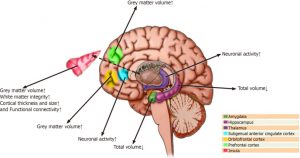Improve Neuropsychological Disorders with Yoga
By John M. de Castro, Ph.D.
“yoga might be considered as an effective adjuvant for the patients with various neurological disorders including stroke, Parkinson’s disease, multiple sclerosis, epilepsy, Alzheimer’s disease, dementia, headache, myelopathy, neuropathies.” – A.Mooventhan
Mindfulness training and yoga practices have been shown to improve health and well-being in healthy individuals. They have also been found to be effective for a large array of medical and psychiatric conditions, either stand-alone or in combination with more traditional therapies. There has accumulated a large amount of research on the effectiveness of yoga practice for the treatment of a variety of physical and mental issues. Hence, it would be useful to summarize what has been learned.
In today’s Research News article “Therapeutic role of yoga in neuropsychological disorders.” (See summary below or view the full text of the study at: https://www.ncbi.nlm.nih.gov/pmc/articles/PMC8546763/ ) Nourollahimoghadam and colleagues review and summarize the published research regarding the effectiveness of yoga practice for the treatment of a variety of neuropsychological disorders.
They report that the published research found that yoga practice produced significant improvements in physical illnesses including migraine headaches, Alzheimer’s Disease, epilepsy, multiple sclerosis, Parkinson’s Disease, and neuropathy. Yoga practice also produced significant improvements in psychological well-being including anxiety, stress, depression, bipolar disorder, schizophrenia, somatoform disorders, obsessive-compulsive disorder, and burnout. They further report that yoga may produce its beneficial effects by altering the chemistry, electrical activity, structures, and connectivity within the brain.
Hence Yoga practice appears to have a myriad of positive physical and psychological benefits. The authors, however, point to weaknesses in the research including small sample sizes, short-term follow-up, confounding variables, and lack of appropriate controls. So, more and better controlled studies are needed to verify the benefits of yoga practice. Hence, the present state of knowledge supports the engagement in yoga practice to advance the physical and mental well-being of both ill and healthy individuals.
So, improve neuropsychological disorders with yoga.
“Yoga can be a helpful practice of self-care for people with multiple sclerosis (MS) and other neurological conditions (such as stroke, traumatic brain injury, Parkinson’s disease, Lyme’s disease, Lou Gehrig’s disease).” – Mary Hilliker
CMCS – Center for Mindfulness and Contemplative Studies
This and other Contemplative Studies posts are also available on on Twitter @MindfulResearch
Study Summary
Nourollahimoghadam, E., Gorji, S., Gorji, A., & Khaleghi Ghadiri, M. (2021). Therapeutic role of yoga in neuropsychological disorders. World journal of psychiatry, 11(10), 754–773. https://doi.org/10.5498/wjp.v11.i10.754
Abstract
Yoga is considered a widely-used approach for health conservation and can be adopted as a treatment modality for a plethora of medical conditions, including neurological and psychological disorders. Hence, we reviewed relevant articles entailing various neurological and psychological disorders and gathered data on how yoga exerts positive impacts on patients with a diverse range of disorders, including its modulatory effects on brain bioelectrical activities, neurotransmitters, and synaptic plasticity. The role of yoga practice as an element of the treatment of several neuropsychological diseases was evaluated based on these findings.
Core Tip: A multitude of beneficial effects of yoga practice and the underlying mechanisms of action have been reported and point out its role as an influential element in the integrative therapy of various neuropsychological disorders. In the planning of further investigations, studies should be designed to achieve more accuracy and precision in the heterogeneous field of yoga practices and potential fields of application.
https://www.ncbi.nlm.nih.gov/pmc/articles/PMC8546763/









